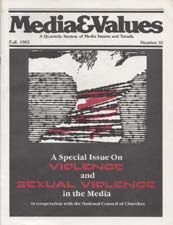YOUTH: Teens Need Better Rites of Passage
|
This article originally appeared in Issue# 33
|
For many youth there are no rites of passage that confirm their arrival at adulthood, except for the driver's license, the permission to purchase alcohol, and the right to see R-rated films. Confirmation even appears to be greater when these rites can be combined. Because of this situation, many young people limit their film patronage to only R's and X's until the point is made – much the same way that adults frequent various clubs to signify their financial or social arrival.
Ironically, for many young people, the film rating system is far from helpful to their welfare. The pressure is on both the male and female to suggest R's for dates, both for status and titillation. And every slasher film producer knows how to promote to these stimulus points.
The question facing young people is what to do with such vicious violence couched in an erotic context– especially when they are just beginning to learn how to engage in significant social relationships.
Probably the most common approach is to dehumanize the violence, even to laugh about it as one would triumph in laughter over a fear-producing ride at an amusement park. This attempt at desensitization can backfire, both immediately and over a long period of time, as couples lose their awareness of each other as persons.
Another reaction is to view the aggressive behavior as a model for their own, stopping just short of the actual violence. Though as we hear in the news each day, it does not always stop short. Both of these reactions are harmful, but there is no way to test the extent of that harm, nor even to know the number of youth affected. Church or synagogue youth groups could provide immeasurable help to their members and their peers by focusing in on these films and how to respond to them.
Warning: There may be some resistance. Youth may say that these are only harmless little films and adults need  not bother, especially if they suspect censorship. Parents may even agree by adding that their kids wouldn't go to this kind of film anyway and should not be exposed to it in a youth group. Youth leaders, however, know that discussion from a values perspective is desperately needed by young people building their adult value systems. Confronting the conflict between what is shown on the screen and what one feels inside is necessary for healthy growth.
not bother, especially if they suspect censorship. Parents may even agree by adding that their kids wouldn't go to this kind of film anyway and should not be exposed to it in a youth group. Youth leaders, however, know that discussion from a values perspective is desperately needed by young people building their adult value systems. Confronting the conflict between what is shown on the screen and what one feels inside is necessary for healthy growth.
It may be helpful to the discussion to use a few clips of these kinds of films. If parents express uneasiness about showing clips, arrange a meeting for them to show the clips and discuss the problem. The impact of even a few examples should convince parents that it is crucial for their children to deal with this subject in a group concerned about values rather than to experience it alone or with a date.
Suffice it to say that if no concern is shown by youth leaders about this subject, it could easily be assumed that viewing sexually violent films is only one more example of what it means to be an adult today.



